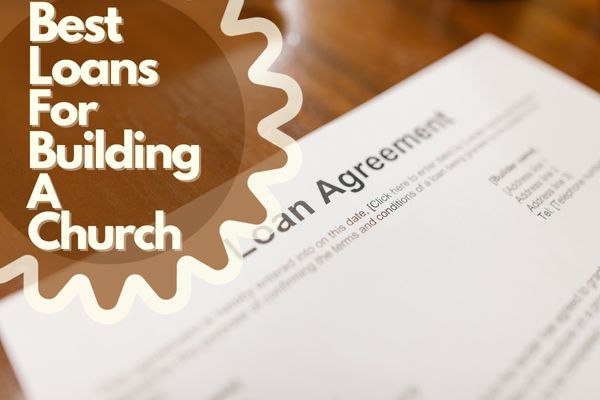Looking for the best loans to build a church? Look no further. In this complete step-by-step guide, we’ll walk you through everything you need to know about finding the best loans for building a church.
From understanding the types of loans available to the application process and repayment options, we’ll cover all the essential information you need to make an informed decision.
So let’s get started and find the best loan to make your church-building dreams a reality.
Contents
Best Loans For Building A Church
1. Church Financing Programs
Many banks and credit unions offer specialized loan programs for churches, which could include construction loans, mortgage loans, and lines of credit.
2. Faith-based Lender
Several faith-based lending organizations offer financing options to churches and other religious organizations. Examples include the United Methodist Development Fund, the Lutheran Church Extension Fund, and the Episcopal Church Building Fund.
3. Government Loans
The Small Business Administration (SBA) offers several loan programs that could be used for building a church, including the 7(a) loan program and the CDC/504 loan program.
4. Community Development Financial Institutions (CDFIs)
CDFIs provide financial services to underserved communities, including religious organizations. Some CDFIs offer loans for building churches and other religious facilities.
5. Crowdfunding
Crowdfunding platforms like Kickstarter, GoFundMe, and Indiegogo can be used to raise funds for building a church.
6. Personal Loans
In some cases, individuals may be able to take out personal loans to finance the construction of a church.
7. Grants
Several grant programs are available for religious organizations, including the National Fund for Sacred Places and the National Trust for Historic Preservation.
8. Charitable Donations
Many churches rely on donations from their members to fund construction projects.
9. Church Fundraising Events
Churches can organize fundraising events like bake sales, auctions, and raffles to raise money for construction projects.
10. Endowments
Some churches may have endowments that can be used to finance construction projects.
11. Private Foundations
Private foundations may provide grants or loans to religious organizations for construction projects.
12. Corporate Sponsorships
Churches can seek corporate sponsorships to help fund construction projects.
13. Church Bonds
Some churches may issue bonds to finance construction projects.
14. Sales
Churches can sell their existing properties to finance the construction of a new church.
15. Tax-exempt Financing
Churches may be eligible for tax-exempt financing, which can lower the cost of borrowing.
What To Do When You Want Loans For Building A Church
1. Research Church Financing Programs
Start by researching the loan programs banks and credit unions offer for churches. You can do this by searching online, requesting referrals from other church leaders, or visiting local branches in person.
Compare each program’s interest rates, repayment terms, and other fees.
2. Explore Faith-Based Lenders
Research faith-based lending organizations that offer financing options for churches, such as the United Methodist Development Fund, the Lutheran Church Extension Fund, and the Episcopal Church Building Fund.
Review their requirements and application processes to determine if they fit your needs well.
3. Consider Government Loans
Investigate loan programs offered by the Small Business Administration (SBA), such as the 7(a) and CDC/504 loan programs, which could be used for building a church.
Review the eligibility requirements and application process, and consider hiring a financial advisor to help you navigate the process.
4. Look Into Community Development Financial Institutions (CDFIs)
Explore CDFIs that offer loans for building churches and other religious facilities. Research the requirements and application process to determine if they fit your needs well.
5. Consider Crowdfunding
If you’re comfortable with crowdfunding, you can use platforms like Kickstarter, GoFundMe, and Indiegogo to raise funds for building a church.
Develop a compelling campaign and promote it on social media to increase your chances of success.
6. Explore Personal Loans
Research personal loans that you or members of your congregation may be able to take out to finance the construction of a church.
Be sure to compare the interest rates, repayment terms, and other fees associated with each loan.
7. Research Grants
Look into grant programs available for religious organizations, such as the National Fund for Sacred Places and the National Trust for Historic Preservation.
Review the eligibility requirements and application process for each program.
8. Consider Charitable Donations
Many churches rely on donations from their members to fund construction projects. Develop and promote a fundraising campaign within your congregation to raise funds for building a church.
9. Organize Fundraising Events
Host fundraising events like bake sales, auctions, and raffles to raise money for construction projects. Be sure to promote these events widely to maximize participation.
10. Look Into Endowments
Investigate whether your church has endowments that can be used to finance construction projects.
11. Explore Private Foundations
Research private foundations that provide grants or loans to religious organizations for construction projects. Review the requirements and application process for each foundation.
12. Consider Corporate Sponsorships
Reach out to local businesses and seek corporate sponsorships to help fund construction projects.
13. Look Into Church Bonds
Investigate whether your church can issue bonds to finance construction projects. Be sure to consult with a financial advisor to determine the best approach.
14. Consider Property Sales
Evaluate whether your church can sell its existing properties to finance the construction of a new church.
15. Explore Tax-Exempt Financing
Determine whether your church is eligible for tax-exempt financing, which can lower the cost of borrowing. Be sure to consult with a financial advisor to determine the best approach.
Following these steps, you can explore potential loan options and identify the best financing approach for your church’s building project.
Step-By-Step Guide For Financing A Church Building Project
1. Church Financing Programs
- Research the loan programs offered by banks and credit unions specializing in church financing.
- Compare each program’s interest rates, repayment terms, and other fees.
- Determine the eligibility requirements for each program.
- Gather the necessary documentation, such as financial statements, tax returns, and project plans.
- Apply for the loan program that best fits your needs.
- Follow up with the lender and provide any additional documentation or information as requested.
- Review the loan agreement and sign it if you agree with the terms.
2. Faith-Based Lenders
- Research faith-based lending organizations that offer financing options for churches.
- Review their requirements and application processes to determine if they fit your needs well.
- Gather the necessary documentation, such as financial statements, tax returns, and project plans.
- Apply for the loan program that best fits your needs.
- Follow up with the lender and provide any additional documentation or information as requested.
- Review the loan agreement and sign it if you agree with the terms.
3. Government Loans
- Research loan programs offered by the Small Business Administration (SBA) could be used for building a church.
- Review the eligibility requirements and application process for each program.
- Determine if you need a financial advisor to help you navigate the process.
- Gather the necessary documentation, such as financial statements, tax returns, and project plans.
- Apply for the loan program that best fits your needs.
- Follow up with the lender and provide additional documentation or information as requested.
- Review the loan agreement and sign if you agree with the terms.
4. Community Development Financial Institutions (CDFIs)
- Research CDFIs that offer loans for building churches and other religious facilities.
- Review the eligibility requirements and application process for each program.
- Gather the necessary documentation, such as financial statements, tax returns, and project plans.
- Apply for the loan program that best fits your needs.
- Follow up with the lender and provide additional documentation or information as requested.
- Review the loan agreement and sign if you agree with the terms.
5. Crowdfunding
- Create a compelling campaign that explains your church’s mission and the importance of the building project.
- Set a fundraising goal and determine the amount you need to raise.
- Choose a crowdfunding platform, such as Kickstarter, GoFundMe, or Indiegogo.
- Promote your campaign on social media, email newsletters, and other channels to reach as many potential donors as possible.
- Thank your donors and keep them updated on the progress of the building project.
6. Personal Loans
- Research personal loans that you or members of your congregation may be able to take out to finance the construction of a church.
- Compare each loan’s interest rates, repayment terms, and other fees.
- Determine if you or members of your congregation meet the eligibility requirements for each loan.
- Apply for the loan that best fits your needs.
- Follow up with the lender and provide any additional documentation or information as requested.
- Review the loan agreement and sign if you’re comfortable with the terms.
7. Grants
- Research grant programs that could fund a church building project.
- Review the eligibility requirements and application process for each grant.
- Gather the necessary documentation, such as financial statements, tax returns, and project plans.
- Apply for the grant program that best fits your needs.
- Follow up with the grant provider and provide any additional documentation or information as requested.
- Review the grant agreement and sign if you agree with the terms.
8. Donations
- Develop a fundraising plan to encourage donations for the church building project.
- Identify potential donors, including members of the congregation, local businesses, and community organizations.
- Use social media, email newsletters, and other channels to promote the fundraising campaign and encourage donations.
- Acknowledge all donations and thank donors for their support.
- Keep donors updated on the progress of the building project.
9. Corporate Partnerships
- Research potential corporate partners interested in supporting a church-building project.
- Develop a proposal that outlines the project and the benefits of partnering with the church.
- Reach out to potential corporate partners and share the proposal.
- Follow up with interested companies and negotiate the terms of the partnership.
- Sign a partnership agreement outlining both parties’ responsibilities and benefits.
10. Religious Organizations
- Research religious organizations interested in supporting a church-building project.
- Develop a proposal that outlines the project and the benefits of partnering with the church.
- Reach out to potential religious organizations and share the proposal with them.
- Follow up with interested organizations and negotiate the terms of the partnership.
- Sign a partnership agreement that outlines the responsibilities and benefits for both parties.
11. Fundraising Events
- Plan a fundraising event, such as a charity auction, a concert, or a dinner.
- Promote the event through social media, email newsletters, and other channels to attract attendees and donations.
- Acknowledge all donations and thank donors for their support.
- Keep donors updated on the progress of the building project.
12. Church Bonds
- Research church bond programs that offer to finance for building projects.
- Review the eligibility requirements and application process for each program.
- Gather the necessary documentation, such as financial statements, tax returns, and project plans.
- Apply for the bond program that best fits your needs.
- Follow up with the bond provider and provide additional documentation or information as requested.
- Review the bond agreement and sign it if you’re comfortable with the terms.
13. Philanthropic Foundations
- Research philanthropic foundations that support religious organizations and church-building projects.
- Review the eligibility requirements and application process for each foundation.
- Develop a grant proposal that outlines the project and the benefits of partnering with the church.
- Submit the grant proposal to the foundation that best fits your needs.
- Follow up with the foundation and provide any additional documentation or information as requested.
- Review the grant agreement and sign if you’re comfortable with the terms.
14. Church Planting Organizations
- Research church planting organizations that offer funding and support for new churches.
- Review the eligibility requirements and application process for each organization.
- Develop a proposal that outlines the project and the benefits of
partnering with the organization. - Submit the proposal to the church planting organization that best fits your needs.
- Follow up with the organization and provide any additional documentation or information as requested.
- Review the partnership agreement and sign it if you agree with the terms.
15. Church Members’ Investments
- Develop a plan for church members to invest in the building project.
- Outline the investment terms and potential returns.
- Share the investment plan with church members and provide them with all the necessary information.
- Collect investments from interested church members.
- Keep investors updated on the progress of the building project.
- Return investments and provide returns according to the agreed-upon terms.
Conclusion
Building a church requires a lot of resources, and financing is often the biggest challenge. However, with careful planning and research, many options are available for churches to secure funding for their building projects.
From loans and grants to fundraising events and partnerships, churches can choose the financing option that best fits their needs and budget.
Reviewing all financing agreements carefully and ensuring you’re comfortable with the terms before signing is essential.
With the right financing, churches can build beautiful, functional spaces that serve their communities for years.






